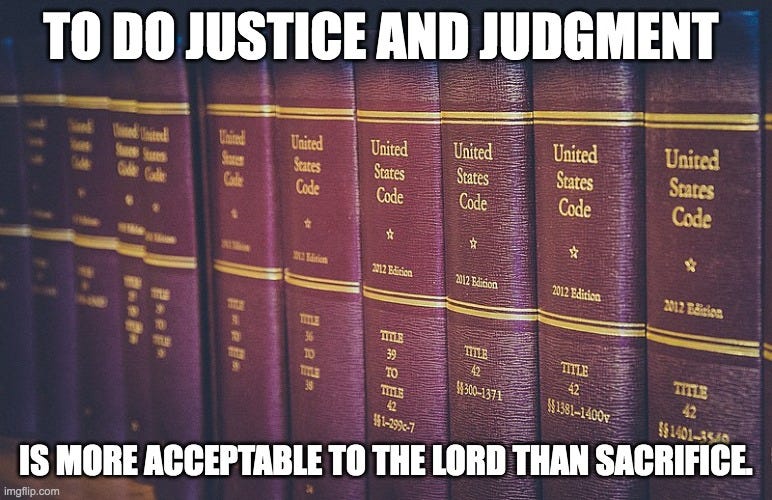I was asked once,
“If God’s Word is the source of justice, why has it been used so often for injustice?”
Now that is a bit of a misquote of what I believe, so let me state what I actually said and believe:
“The only standard for justice is God‘s law. God‘s law is found in Gods Word. So if some thing is self-confessedly (and actually) not according to God‘s word it is therefore not just. By definition.”
But regardless of how it is put, the question is raised, the argument becomes:
“Since God’s (written) Law is used so often for injustice, why do I call it the standard for justice? Shouldn’t we instead use some other standard?”
This argument fails for three reasons: It has false premises, it uses false logic, and it relies upon false facts.
False Premises
Something cannot be better than the standard it is held against. Nothing can be blacker than black.
The view point I am putting forward is that God’s Law is the standard by which all morality, all action, is to be judged. Thus it is literally a contradiction in terms for someone to say ‘But God’s Law is immoral here’.
The only way this question even makes sense is if the questioner denies the premise of the system they are arguing about. They have to first assume that God’s Law is flawed, put forth a system that is less flawed, and compare God’s Law to that system. But this is to beg the question: to assume what you would have to prove.
But the point of a presuppositional argument such as this one is that you have to start from a standard: you cannot arrive at one.
False Logic
The fact (if it existed, see below) that God’s Law is used by some to justify their bad behaviour does not, in any sense, nullify its importance in determining good behaviour. Suppose someone wrote an evil document in English: would we propose banning English? Suppose someone used logic in planning murderous executions: would this make logic an evil thing?
Many things are good but can be used for evil, or to justify evil. The Laws of Physics and chemistry are used in creating weapons by evil regimes, and used for evil purposes. Logic, reason, and rhetoric are used to justify the most evil acts.
Certainly someone legitimately attempting to apply God’s Law can fail. But that failure can only be judged against God’s Law. And someone not seeking to apply God’s Law, who may not even be aware of the book it is written in, may, by dint of natural revelation, apply it anyway. They may even do a better job than the person seeking to apply it!
But we could only judge the two… against God’s Law itself. The student learning math facts is aware that these facts exist. That they are true. He may, while doing his sums or reciting, get some of them wrong; but that doesn’t change their truth, and that doesn’t obviate his need to keep trying to learn and apply them correctly.
False Facts
It is simply not true that the mass, or even a large minority, of the people murdered or otherwise treated evilly in history were in the grip of other people who were doing their best to apply God’s Law.
First of all, the truly great massacres of the last couple of hundred years were carried out by those acting on non-Biblical, indeed anti-Biblical, principles. Mark, Lenin, Hitler, Pol Pot, Mao, these mass murderers were none of them even pretending, let alone seriously attempting, to operate under even their best understanding of God’s Law.
And, contrariwise, when there was opposition to these murders (which there too rarely was) it tended to come from societies which, on the other hand, were operating on at least the cultural heritage of Biblical Principles (the US and Britain, for example, in WWII).
Indeed any dispassionate look at human history will find that the effect of a society attempting, seriously attempting, to apply Biblical principles to their society, including their judicial system, is overwhelmingly positive, not only for themselves but for their neighbours.
And if looked at more deeply one will see that for every thousand of these attempts, there has been huge pressure to secularise… meaning that the attempt has only rarely been carried out to anything like a viable level.
And contrariwise if one looks at the overwhelming mass of times that other systems of morality have been used to form society, the result has been extraordinarily negative: with the caveat that every society that has every existed has implemented God’s Law in some form, for some parts of it. A society which literally said, “Murder is great, theft is awesome, adultery is wonderful… etc etc would be a society that would not live beyond the dawn of the next day.” All societies have God’s Law as the core from which they stray.
(Even MASH, which glorified sexual immorality, still managed to be shocked and appalled when BJ strayed.)
Sin
But if the question is actually,
“Why, with a perfect law, do people not have a perfect society?”
Then the answer is easy (and found in that law itself): sin. The Israelites were given that perfect law, handed down from heaven itself… and Moses hadn’t even made it down the mountain before they had broken it. Time and again even the best of characters, the most loving, the wisest, are shown sinning. Are shown ignoring and perhaps even justifying their violation of God’s Law.
The fact that a student has in his possession a perfect copy of the math facts does not mean he will always remember them. Most students will not deliberately get them wrong. But the moral facts literally involve the list of things that we wish to get wrong. We wish to commit adultery: thus God tells us not to. We wish to covet and steal, and He makes it clear we are not to do so.
Thank you for reading Von’s Substack. I would love it if you commented! I love hearing from readers, especially critical comments. I would love to start more letter exchanges, so if there’s a subject you’re interested in, get writing and tag me!
Being ‘restacked’ and mentioned in ‘notes’ is very important for lesser-known stacks so… feel free! I’m semi-retired and write as a ministry (and for fun) so you don’t need to feel guilty you aren’t paying for anything, but if you enjoy my writing (even if you dramatically disagree with it), then restack, please! Or mention me in one of your own posts.
If I don’t write you back it is almost certain that I didn’t see it, so please feel free to comment and link to your post. Or if you just think I would be interested in your post!
If you get lost, check out my ‘Table of Contents’ which I try to keep up to date.
Von also writes as ‘Arthur Yeomans’. Under that name he writes children’s, YA, and adult fiction from a Christian perspective. His books include:
The Bobtails meet the Preacher’s Kid
and
Arthur also has a substack, and a website.
Thanks again, God Bless, Soli Deo gloria,
Von








